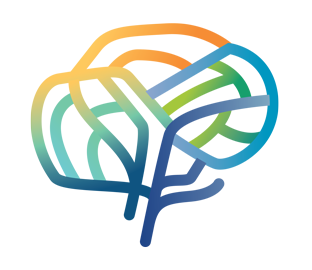An International Educational Program
THE FAMILY PROGRAM
Our online, entertaining Family Program guides parents and kids on how to change their brain and nervous system to yield remarkable, lasting results.
Upcoming Family Program: Part 1*
March 20, 2026-June 6, 2026
Just parents participate during the first two weeks; kids join on April 5.
*Families have the option to enroll in Part 2 after completing Part 1.
$345 - Base Family Program (Self-Guided)
$695 - Base Family Program (with Basic Support)
$945 - Base Family Program (with Premium Support)
Learn more about these options

How can one approach address so many ways that people struggle?
What makes our
Family Program unique?
Participants
Kids ages 3-18 struggling with anxiety, focus, learning, speech, emotional regulation, sensory processing, socializing, and other challenges, with at least one parent who changes their own brain alongside their child
Commitment
30 (or 20) minutes daily doing lower brain movements (participants choose which works best for them) while learning about the nervous system; another 10 minutes daily to review parent-only support materials
Content
Weekly engaging videos, audio clips, infographics, and activities to become a “connection-mode family” as parents and kids change their nervous system and brain—all in their very own home
The Brain Highways program has earned the respect of both parents and professionals. Its noninvasive approach often helps children move forward in ways that were not previously possible.
Dr. Diane Bedrosian
Watch a preview of the
Family Program’s materials and daily format.
Might seem like an ordinary photo of a father and daughter, looking at each other. But that kind of eye contact never happened in 12 years— that is, not until the fourth week of the pons course. Alexia's father shares, "As a parent, it's heartbreaking when your child really can't look at you. So to be able to chat with her now—while she keeps looking right at me . . . is a father's dream come true."
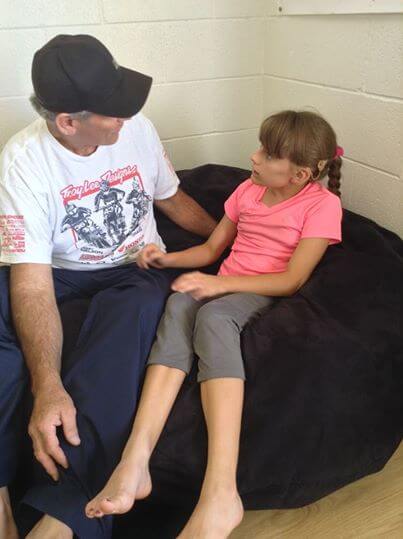
For a long time, AJ tried to tie his shoes -- but with no success. Then, halfway through the pons course, he could just "suddenly" do it! May not seem like a big deal to some people, but trying to tie shoes is often a never-ending source of frustration and disappointment when kids have incomplete lower brain development. Thanks, AJ, for showing others that tireless effort is NOT always enough. We truly need highways in place . . . to do much of what's expected of us.
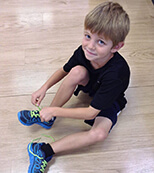
Both kids AND adults reap benefits once they start organizing their brains. Braxton's mom writes: "Braxton can now sit at the dinner table without getting up. He's sleeping better. He's no longer defiant. He has much better balance and coordination. His teacher reports better transitions, increase in focus, decrease in fears, increased ability to self-regulate, more talkative, more inquisitive, and ability to follow multi-step directions." For her changes, she writes: "I'm overall calmer. I feel more grounded. I also feel less depressed, less anxious, and less angry." Sweet!
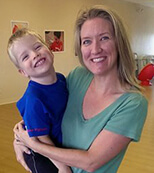
Bryce has the same teacher as last year. But at the start of school, she pulled his mom aside to say that Bryce is a completely different boy. For example, he is now sitting still and focusing in class. He is calm and complimenting other kids when they share. His teacher wanted to know, "What changed over summer?" Well, Bryce had been developing his lower brain! And that's also why Bryce is no longer bothered by noises, sleeps through the night, has great hand-eye coordination, tries new foods, has lots of friends, reads fluently, writes with ease, and shows an inner strength, peacefulness, and confidence.
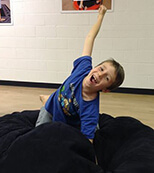
At Elijah's Brain Highways midbrain class, he shared what he had written at school that day—in just fifteen minutes—and how (before) he had never written a whole page in his entire life. And, yes, Elijah's mom was crying (happy tears) as he read aloud what he had written. Yep, writing starts to get a whole lot easier once more highways are in place!

Although CJ spent three years doing sleep therapy at Children's Hospital, he still wouldn't sleep in his own bed. At Week 4 of the midbrain course, CJ's mom shared, "During CJ's prayers at bedtime, he thanked God for Brain Highways . . . where he then went to sleep. IN HIS OWN BED. By himself." And that's been the norm for the last three weeks. Congratulations, CJ, for building new highways . . . and for using them!
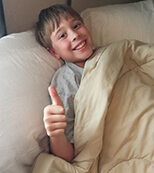
Once we start changing the brain and nervous system, first-time-evers (!) are very common. Yet, it never gets old hearing about those special moments. Here's what Sully's mom just shared, "On Saturday night, Sully sat and watched a whole movie, on the couch, without getting up, with our whole family. This is a first for us!!!"
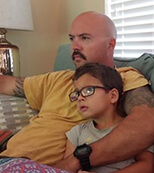
Four weeks into the pons course, Lance shared: "I was in line for the roller coaster when a kid started screaming. His dad took him out of the line, but his brother was still there. He was a kid who was born different. I saw he had no one to go on the ride, so I asked, 'Do you want to ride it with me?' We went together. When we were going down the fast part, he held my hand and I held his. When we got off the ride, his dad came up and asked if I would like do a play date with his son. I felt proud. But I wish people were also nice (like that) to me."

The kids are back in school, and this is what we often hear about kids (like Thomas) after they've been building highways over the summer. Thomas's mom shared: "He started school this year without tears. He gets up in the morning (without whining or crying). Yesterday and today, he initiated doing his homework and didn't want to stop! I am so grateful because this new behavior is the complete opposite of what we had just about every day last year!"

Frequently Asked Questions
Click through to read some of our favorite Facebook posts of participants’ first-time-ever changes.
Base Family Program
$345
-
New weekly videos, audios, and infographics
-
How to develop the lower brain
-
How to change the nervous system
-
Assessments and short written assignments (but without feedback)
-
As many family members as you choose (3 years old and up)
With Basic Support
$695
-
New weekly videos, audios, and infographics
-
How to develop the lower brain
-
How to change the nervous system
-
1:1 Zoom sessions every other week
-
Support for up to 3 family members
-
Feedback on video assessments and short, written assignments
-
Answers to questions
-
Personalized program modifications
With Premium Support
$945
-
New weekly videos, audios, and infographics
-
How to develop the lower brain
-
How to change the nervous system
-
1:1 Zoom sessions every week
-
Support for up to 4 family members
-
Feedback on video assessments and short, written assignments
-
Answers to questions
-
Personalized program modification
As part of the enrollment process, you'll confirm that you've read the corresponding "What You Need to Know" page for whichever option you chose.
Family Program Options
The self-guided Family Program reflects decades of working with thousands of parents and kids. Some families will only need this option to yield life-changing lasting results, while other families may prefer to add individualized support and feedback by interacting with an experienced class facilitator. All options are 100% online.
